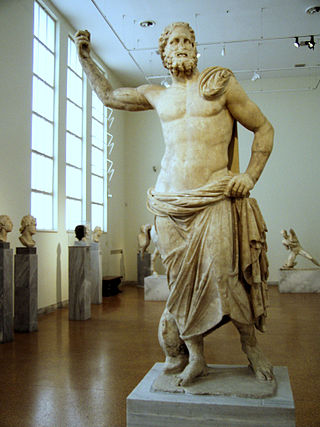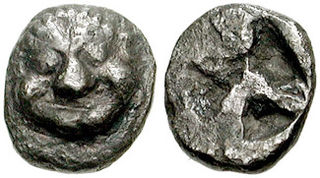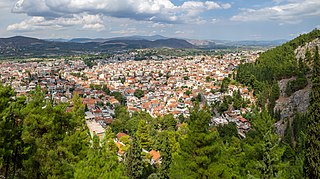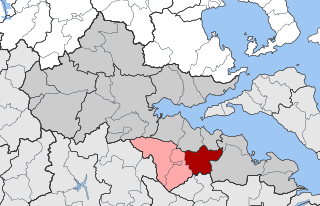Athens is the capital of Greece.
Contents
Athens may also refer to:
Athens is the capital of Greece.
Athens may also refer to:

Athena or Athene, often given the epithet Pallas, is an ancient Greek goddess associated with wisdom, warfare, and handicraft who was later syncretized with the Roman goddess Minerva. Athena was regarded as the patron and protectress of various cities across Greece, particularly the city of Athens, from which she most likely received her name. The Parthenon on the Acropolis of Athens is dedicated to her. Her major symbols include owls, olive trees, snakes, and the Gorgoneion. In art, she is generally depicted wearing a helmet and holding a spear.

Athens is the capital and largest city of Greece. A major coastal urban area in the Mediterranean, Athens is also the capital of the Attica region and is the southernmost capital on the European mainland. With its urban area's population numbering over three and a quarter million, it is the eighth largest urban area in the European Union. The Municipality of Athens, which constitutes a small administrative unit of the entire urban area, had a population of 643,452 (2021) within its official limits, and a land area of 38.96 km2 (15.04 sq mi).

The Acropolis of Athens is an ancient citadel located on a rocky outcrop above the city of Athens, Greece, and contains the remains of several ancient buildings of great architectural and historical significance, the most famous being the Parthenon. The word Acropolis is from the Greek words ἄκρον and πόλις. The term acropolis is generic and there are many other acropoleis in Greece. During ancient times the Acropolis of Athens was also more properly known as Cecropia, after the legendary serpent-man Cecrops, the supposed first Athenian king.

Poseidon is one of the Twelve Olympians in ancient Greek religion and mythology, presiding over the sea, storms, earthquakes and horses. He was the protector of seafarers and the guardian of many Hellenic cities and colonies. In pre-Olympian Bronze Age Greece, Poseidon was venerated as a chief deity at Pylos and Thebes, with the cult title "earth shaker"; in the myths of isolated Arcadia, he is related to Demeter and Persephone and was venerated as a horse, and as a god of the waters. Poseidon maintained both associations among most Greeks: he was regarded as the tamer or father of horses, who, with a strike of his trident, created springs. His Roman equivalent is Neptune.

The Parthenon is a former temple on the Athenian Acropolis, Greece, that was dedicated to the goddess Athena. Its decorative sculptures are considered some of the high points of classical Greek art, and the Parthenon is considered an enduring symbol of Ancient Greece, democracy, and Western civilization.
This article concerns the period 459 BC – 450 BC.

Cecrops was a mythical king of Attica which derived from him its name Cecropia, having previously borne the name of Acte or Actice. He was the founder and the first king of Athens itself though preceded in the region by the earth-born king Actaeus of Attica. Cecrops was a culture hero, teaching the Athenians marriage, reading and writing, and ceremonial burial.

Boeotia, sometimes Latinized as Boiotia or Beotia is one of the regional units of Greece. It is part of the region of Central Greece. Its capital is Livadeia, and its largest city is Thebes.

Plataea was an ancient Greek city-state situated in Boeotia near the frontier with Attica at the foot of Mt. Cithaeron, between the mountain and the river Asopus, which divided its territory from that of Thebes. Its inhabitants were known as the Plataeans.

Attica, or the Attic Peninsula, is a historical region that encompasses the entire Athens metropolitan area, which consists of the city of Athens, the capital of Greece and the core city of the metropolitan area, as well as its surrounding suburban cities and towns. It is a peninsula projecting into the Aegean Sea, bordering on Boeotia to the north and Megaris to the west. The southern tip of the peninsula, known as Laurion, was an important mining region.

The obol was a form of ancient Greek currency and weight.
Pyrgos or Pyrgus may refer to:
Nysa may refer to:
Neapoli or Neapolis may refer to:

Eleutherae is a city in the northern part of Attica, bordering the territory of Boeotia. One of the best preserved fortresses of Ancient Greece stands now on the spot of an Ancient Eleutherae castle, dated between 370 and 360 BC, with walls of very fine masonry that average 2.6m thick. A circuit of wall 860 m contained towers, 6 of them still standing along the northern edge of the site, preserved to the height of 4 to 6 m. The foundations of more towers are present. Although not as well preserved, the line of the remainder of the fortification circuit is clear, as is the location of the one large, double gate (western) and one small (south-eastern) gate. There are two small sally-ports located on the north side. The fortified area is irregular and c. 113 by 290m in extent.

Livadeia is a town in central Greece. It is the capital of the Boeotia regional district. Livadeia lies 90 km (56 mi) north-west of Athens, 64 km (40 mi) west of Chalkida, 63 km (39 mi) south-east of Lamia, 44 km (27 mi) east-south-east of Amfissa, and 91 km (57 mi) east-north-east of Nafpaktos. The town lies some five kilometres west of Greek National Road 3, to which it is linked by National Road 48.

Arrhephoria was a feast among the Athenians, instituted in honor of Athena. The word is derived from the Greek term Ἀρρηφόρια, which is composed of ἄρρητος, "unspoken, not to be divulged", and φέρω, "I carry". This feast was also called Hersiphoria, from Herse, the daughter of Cecrops, on whose account it was established.

Elateia was an ancient Greek city of Phthiotis, and the most important place in that region after Delphi. It is also a modern-day town that is a former municipality in the southeastern part of Phthiotis. Since the 2011 local government reform, it is a municipal unit of the municipality Amfikleia-Elateia. Its population is 2,804 inhabitants and its land area is 154.361 km2. The municipal seat was the town of Eláteia ; other communities are Zeli (466), Panagítsa (148), Lefkochóri (99) and Sfáka (89).
Athenae or Athenai was a city and port of ancient Pontus, with a Greek temple of Athena. According to Arrian, it was 180 stadia east of the river Adienus, and 280 stadia west of Apsarus. Procopius writes that the name of the village came from a certain woman named Athenaea in early times who ruled over the land and not because, as some believe, of colonists from Athens settled there. He also adds that the tomb of the woman was still there. Arrian speaks of the place as a deserted fort, but Procopius describes it as a populous place in his time. Konrad Mannert assumes it to be the same place as the Odeinius of the Periplus of Pseudo-Scylax.
Athenae is another name for the city of Athens. Athenae may also refer to: